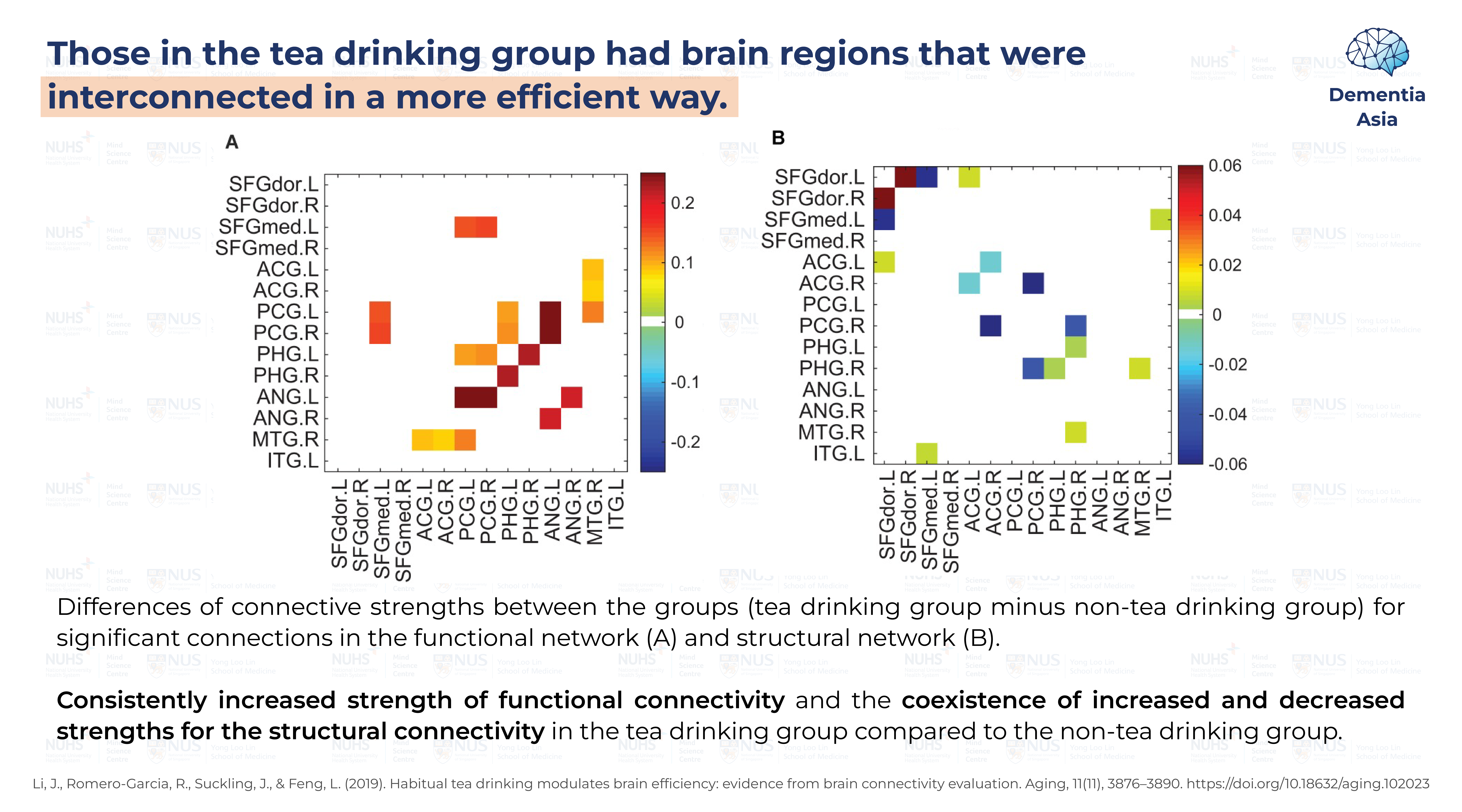Tea Drinking & Its Benefits on Cognitive Health
With the ageing population and lack of effective pharmacological treatments for dementia, interest in non-pharmacological, preventive interventions is at an all-time high. Researchers are interested to see how our daily diet and lifestyle impact the risks of developing dementia and other age-related conditions.
Tea was always believed to provide numerous health benefits to humans. It is easily available, cheap, and has little to no side effects at normal consumption levels. The practice is also widely accepted globally, as it has been a part of multiple cultures, both in Asian and Western countries alike. This is to say that if tea drinking can prevent dementia, its uptake and subsequent benefits for the population will be phenomenal (Feng et al., 2015).

Dr Feng Lei – Principal Investigator & Research Assistant Professor, Department of Psychological Medicine, Yong Loo Lin School of Medicine, NUS (Photo Credits: NUS Medicine)
Past Research on Long-term Tea Drinking
Long-term tea drinking refers to at least 15 years of regular tea consumption. A previous study found that this was significantly associated with reduced odds of having depressive and anxiety symptoms (Chan et al., 2018).
Data from other cross-sectional studies have also consistently shown that tea drinking is associated with better scores on cognitive tests (Feng et al., 2015). Longitudinal data supports this finding, as reported in the:
- Singapore Longitudinal Aging Study
- Chinese Longitudinal Healthy Longevity Survey
- Cardiovascular Health Study
Tea Drinking Research at Mind Science Centre
While there have been numerous studies on the effects of tea drinking, most have relied on neurocognitive and neuropsychological measures. So far, there has been no exploration of the effect of tea drinking on system-level brain networks.
To address this gap, researchers at Mind Science Centre embarked on a project to investigate both functional and structural brain networks in two groups of older adults: tea drinking group and non-tea drinking group.
Additionally, the team focused on changes in the connectivity within the default mode network (DMN) which was previously suggested to be involved in cognitive disease and normal ageing (Li et al., 2019).
Tea Drinking Improves Cognitive Measures

In our study, we compared the neuropsychological and cognitive measures of the tea drinking and non-tea drinking group. A significant difference was found in one out of 12 measures, namely the Block Design test from the Wechsler Adults Intelligence Scale (WAIS-III) (Li et al., 2019). The Block Design test is commonly used to measure visual-spatial ability, constructional praxis, motor skill, and problem-solving (Joung et al., 2021).
Habitual Tea Drinking Modulates Brain Efficiency

Above improvements in cognitive scores, exploration of strengths of connections within the default mode network identified consistently increased strength of functional connectivity. As shown in figure A above, eleven functional connections exhibited a significant enhancement in strength in the tea drinking group.
Contrastingly, both increased and decreased strengths were observed in structural connectivity. The number of structural connections significantly increased was comparable to those significantly decreased.
All these findings suggest that there is an association between tea drinking and alterations in connective strength. This is notable as a brain with improved connection strengths experiences milder disruptions in connectivity. This results in higher efficiency for communications and information exchange between regions. In other words, habitual tea drinking is linked with improvements in our brain’s information processing capability (Li et al., 2019).
Learn more about tea drinking: MAELab Virtual Tour

Our research on tea drinking was curated into an art exhibition titled “Arts, Mindfulness & the Ageing Brain”, showcased at MAELab (Mind Art Experiential Lab).
MAELab is an innovative space for discovery of creative and integrative interventions through art, mindfulness, and transdisciplinary research to promote mental wellness and enhance quality of mind.
Click here to journey through our virtual tour!
References
Feng, L., Chong, M. S., Lim, W. S., Lee, T. S., Kua, E. H., & Ng, T. P. (2015). Tea for Alzheimer Prevention. The journal of prevention of Alzheimer’s disease, 2(2), 136–141. https://doi.org/10.14283/jpad.2015.57
Chan, S.-P. ., Yong, P. Z., Sun, Y., Mahendran, R., Wong, J. C. M., Qiu, C., Ng, T.-P. ., Kua, E.-H. ., & Feng, L. (2017). ASSOCIATIONS OF LONG-TERM TEA CONSUMPTION WITH DEPRESSIVE AND ANXIETY SYMPTOMS IN COMMUNITY-LIVING ELDERLY: FINDINGS FROM THE DIET AND HEALTHY AGING STUDY. The Journal of Prevention of Alzheimer’s Disease, 1–5. https://doi.org/10.14283/jpad.2017.20
Li, J., Romero-Garcia, R., Suckling, J., & Feng, L. (2019). Habitual tea drinking modulates brain efficiency: evidence from brain connectivity evaluation. Aging, 11(11), 3876–3890. https://doi.org/10.18632/aging.102023
Joung, H., Yi, D., Ahn, H., Lee, Y., Byun, M. S., Sung, K., Han, D., & Lee, D. Y. (2021). Normative Study of the Block Design Test for Adults Aged 55 Years and Older in Korean Aging Population. Psychiatry Investigation, 18(6), 539–544. https://doi.org/10.30773/pi.2020.0408
